Voices of GoTo: In this series, we highlight the people that make flexible work, work: our employees! GoTo is a global company with more than 4000 employees around the world, these are their stories.
Eva Jocsak is a Senior Talent Acquisition Partner at GoTo. She helps grow exceptional teams and enjoys learning (and showcasing) people’s stories. Born in eastern Hungary, she enjoys hiking, gardening, and surrounding herself with the beauty of nature. She is also a member of WE (Women+ Employees) at GoTo. In honor of Women’s History Month, I sat down with Eva to talk about her story, passions, and how we can all inspire and connect a little more.
Eva, tell me about yourself and your history.
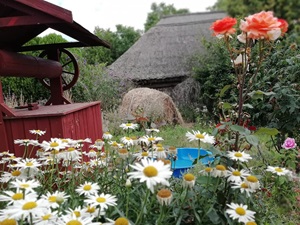 I grew up in a small town in the eastern part of Hungary, close to the Ukrainian border. So, the impact of that conflict hits close to home for me. Even in childhood, I was always very informed about the politics around me, even if I didn’t understand what was happening. I was a sponge. I had no trouble remembering things or preparing for school. My teachers recognized this and encouraged me to pursue education outside our under-resourced town. So, I left home at 14 to live in a student hostel and attend a better high school.
I grew up in a small town in the eastern part of Hungary, close to the Ukrainian border. So, the impact of that conflict hits close to home for me. Even in childhood, I was always very informed about the politics around me, even if I didn’t understand what was happening. I was a sponge. I had no trouble remembering things or preparing for school. My teachers recognized this and encouraged me to pursue education outside our under-resourced town. So, I left home at 14 to live in a student hostel and attend a better high school.
Since then, I’ve continued moving west. I’ve moved over 20 times in my life!
You left the nest early. Did you figure out what you wanted to do in life earlier?
My parents said I could be an economist, a lawyer, or a doctor. I chose none of those. When I went to university, I decided on IT as a major and HR organization development as my minor.
Funnily enough, from the time I got to university, all my boyfriends studied IT or worked in IT. I started to understand them a little more. They are so practical and fact-based. Whereas I am a people person, I like to focus on interpersonal relationships. I never thought they could go together, but it turns out that that’s precisely what I could do years later. I get to interface with different people every day and understand the intricacies of technology and IT since those are the roles I recruit for. It’s the perfect blend of my skills and what I enjoy.
What are you most proud of?
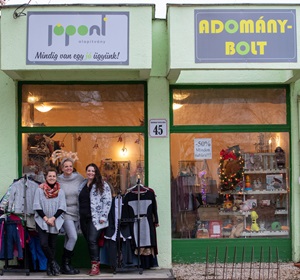 Last November, I started a foundation with two of my friends. It is a charity shop, and every quarter, we have a goal and team up with other nonprofit organizations to find a cause we can support. We support local social and environmental causes. Right now, we’re focused on helping Ukrainian refugees. The Ukrainian crisis touches me because my mom still lives in that bordering town. I know the streets they must walk after the border because I have walked them myself. I plan to volunteer in person as well.
Last November, I started a foundation with two of my friends. It is a charity shop, and every quarter, we have a goal and team up with other nonprofit organizations to find a cause we can support. We support local social and environmental causes. Right now, we’re focused on helping Ukrainian refugees. The Ukrainian crisis touches me because my mom still lives in that bordering town. I know the streets they must walk after the border because I have walked them myself. I plan to volunteer in person as well.
I have a tremendous passion for ERGs (employee resource groups) and activism. I’m working towards being zero waste in my household. Supporting multiple causes is excellent for my mental health, and I have the flexibility to dedicate time to them. I’m proud that I can juggle all these parts of my life.
You say flexibility allows you to pursue these passions. How else does flexible work impact your life (and the lives of others)?
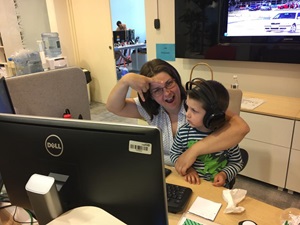 I’m a working mom. I have different hats to wear and many projects to run. When I joined, this was important to me. When you have a sick child at home or have something else on your mind, it can be a lot to manage.
I’m a working mom. I have different hats to wear and many projects to run. When I joined, this was important to me. When you have a sick child at home or have something else on your mind, it can be a lot to manage.
After the pandemic hit, it was hard having my kid at home all the time, but then when I got the hang of it, it was like I became an excellent juggler. I would do work in the morning, drop him off, then come back and work. I would work and cook. It became somewhat of a circus but in a good way. I can have a meeting and cook at the same time. I can run out and do some errands and come back. My life has changed positively. Many parents, especially mothers, find that flexibility in the workplace improves their lives tremendously. 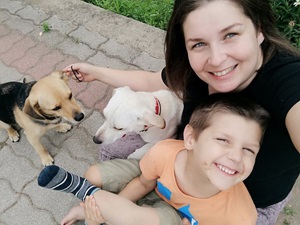
What does it mean to be a woman in your culture or country?
There are different norms and expectations everywhere. We’re a small country, and many have a very traditional way of thinking of women’s roles.
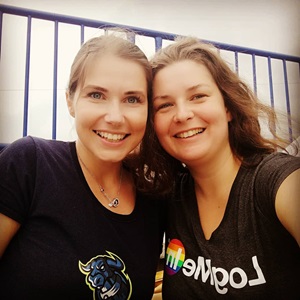 I think that woman’s traditional role of motherhood defines how we think of her. In Hungary, women can take three years of maternity leave. And many mothers do take that time with their children. This has changed a lot in the last 10-15 years, as households can’t afford to lose that income for a time. But now, women are expected to fulfill that traditional role in the home and be successful in their careers. But there’s an imbalance when that happens, and this way of thinking has contributed to the glass ceiling.
I think that woman’s traditional role of motherhood defines how we think of her. In Hungary, women can take three years of maternity leave. And many mothers do take that time with their children. This has changed a lot in the last 10-15 years, as households can’t afford to lose that income for a time. But now, women are expected to fulfill that traditional role in the home and be successful in their careers. But there’s an imbalance when that happens, and this way of thinking has contributed to the glass ceiling.
What women-related taboos or myths do you think should be broken to change that?
That working moms are not effective in their roles. That’s not true. A company might think, “It’s a single mom. If the kid gets sick, what will she do? I will lose her for weeks. She won’t be able to be effective.” But I think the opposite is true. We must be reliable, and it’s a valuable life skill to juggle all these responsibilities.
Another myth worth breaking is that we are not as technical or savvy. Some of the candidates I talk to are surprised that I can talk about our products. Maybe I don’t understand our network jargon on their level, but as I speak to the managers and get the information, I can effectively communicate it to the candidate. Being less technical doesn’t mean you don’t understand. Many women engineers are discouraged if their colleagues might not expect them to be at the same level in these technicalities.
How can men contribute more to women’s empowerment (in the home or at work)?
It's time we understood each other a little more; that’s the key to success. Sometimes it’s hard to talk about these topics, and some men might feel excluded.
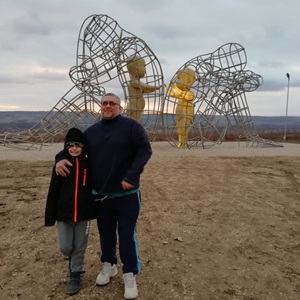 We’ve had short sections of discussions in our WE group, where we started to break down some women’s issues into pieces. The first one was work-life balance, and when I began to invite people from the Hungarian office, I didn’t advertise that this was a “woman’s topic.” It was more so how you could manage work-life balance, and many men showed up. If we had advertised it as a woman’s topic, maybe fewer allies would feel like they could join.
We’ve had short sections of discussions in our WE group, where we started to break down some women’s issues into pieces. The first one was work-life balance, and when I began to invite people from the Hungarian office, I didn’t advertise that this was a “woman’s topic.” It was more so how you could manage work-life balance, and many men showed up. If we had advertised it as a woman’s topic, maybe fewer allies would feel like they could join.
Talking in small groups and sharing our own experiences connects us. Fathers have the same work-life balance issues, so talking about these topics makes the connection and breaks the perceived wall of difference. I encourage men to attend discussions about issues and open discussions about them in the home. We will always welcome their support. They should not feel isolated in this either.
What professional advice would you give to other women?
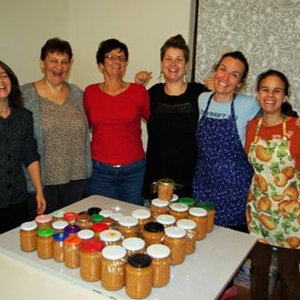 Be seen. So even if you’re feeling invisible in yourself or your professional situation, try to be seen. You don’t have to hide from anything. Don’t be afraid. We always see that women are afraid of not ticking every box. You don’t have to check all the boxes. Just show your talent, your skills, and dive into it. You don’t have to be perfect or prepare yourself so much. Either it’s enough, or it’s not enough. You don’t have to decide upfront; give yourself that opportunity. Speak up. Collect your data; data is always essential to make yourself understood.
Be seen. So even if you’re feeling invisible in yourself or your professional situation, try to be seen. You don’t have to hide from anything. Don’t be afraid. We always see that women are afraid of not ticking every box. You don’t have to check all the boxes. Just show your talent, your skills, and dive into it. You don’t have to be perfect or prepare yourself so much. Either it’s enough, or it’s not enough. You don’t have to decide upfront; give yourself that opportunity. Speak up. Collect your data; data is always essential to make yourself understood.
Secondly, become a part of a community. Gather some supportive women around you. I think it’s a great power to help in any challenging situation. It’s important not to isolate ourselves from the men in our lives, but it’s essential to have a supportive group of women that we can rely on. And to be that for other women.
Any parting words for how to connect with others or ourselves?
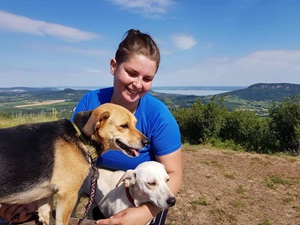 Nature. For me, walking is a solution for everything. Maybe sometimes I’m walking away from things, but that’s okay. Hiking, walking and being in nature. When I’m in my garden, that’s the source of my happiness. You can connect with others when you explore the world with them — connecting with myself and with the universe as with others.
Nature. For me, walking is a solution for everything. Maybe sometimes I’m walking away from things, but that’s okay. Hiking, walking and being in nature. When I’m in my garden, that’s the source of my happiness. You can connect with others when you explore the world with them — connecting with myself and with the universe as with others.
We work where we like, which is why we like where we work. We think you will, too. Interested in joining our team? Look at our opportunities.
Learn more about Eva’s NGO, JóPont Foundation and Charity Shop:
Website | Facebook | InstagramConnect with Eva on LinkedIn






